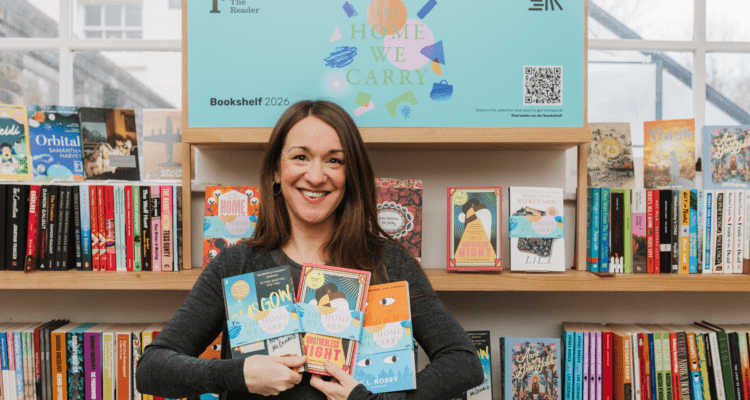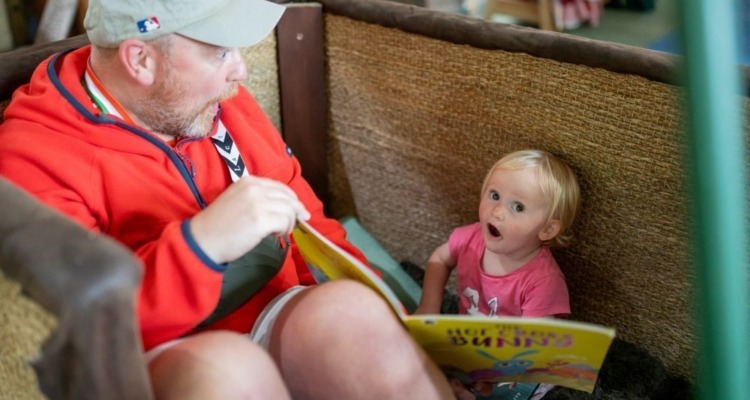New research on what books can do for our mental health during a cost of living crisis

Our new survey of 2,000 people across the UK* reveals:
- Nearly two-fifths (38%) agree that they can relate to literature about people in adverse times more now during a cost-of-living crisis compared to previous years.
- Three in five readers (62%) say reading fictional books with characters they relate to has a positive impact on their mental health.
- Three in ten (34%) say that listening to someone else reading a book or poem aloud has a positive impact on their mental health.
- Over a quarter of people (28%) would consider attending read-aloud groups in their community to improve their mental health and wellbeing (rising to 46% of 18-34 year olds).
More than four-fifths (85%) of adults are reading books (85%) and over half (52%) listening to audiobooks as Britons ‘weather the storm’ of the cost-of-living crisis. Nearly two-fifths of readers (38%) agree that they can relate to literature about people in adverse times more now during a cost-of-living crisis compared to previous years.
While more of us are turning to self-help books and books about social and economic issues to help make sense of the world today (both 41%), the relevance of fiction (37%), non-fiction (37%), poetry (28%) and classic literature (27%) in difficult times has also increased compared to previous years.
We are releasing this research as more people risk being pushed into poor mental health and wellbeing due to the financial stress of the cost-of-living crisis.
The research, carried out by independent agency Opinium, found that three in five (62%) say reading fictional books with characters they relate to has a positive impact on their mental health. While over a quarter of people (28%) would consider attending read-aloud groups in their community to improve their mental health and wellbeing (rising to 46% of 18-34 year olds) and over one-third (32%) are aware that reading aloud with other people has many benefits to their wellbeing.
Amanda, 43, from Doncaster, has social anxieties and mental health issues. After becoming very socially isolated during the pandemic, she volunteered to lead a Shared Reading group at a local peer support group.
She says: “The peer support group is there for anyone who needs it: people with mental health issues, people with learning disabilities or physical disabilities, people who are deaf and people from different minority groups, it’s open to anyone.
“One of the first things we read was from Robinson Crusoe. One man in the group offered to read part of it aloud and afterwards he told me that he hadn’t read aloud in over 20 years. The next week, he told me that he’d gone home, downloaded an app on his phone and read the whole book. I got the impression that he wasn’t a reader, but something had happened to him to make him want to read the full book.
“Shared Reading has improved my mental health. I suffer from anxiety and overthinking is something that I do but I got to a point during one session when I realised I wasn’t questioning myself. I love seeing how other people enjoy the literature and it’s so satisfying to see the impact that the group is having on their lives.”
The Kindfulness Café in Bootle is a non-profit organisation that works to spread kindness and improve mental health in the local community. It offers a variety of groups and activities that promote emotional wellbeing, including Shared Reading.
Karen Siddle, a volunteer who runs a Shared Reading group at the venue, says: “The team here are at the front line of the cost-of-living crisis as more people have been pushed to seek their support. And the ongoing effects of cost-of-living is a topic that comes up all the time in the group.
“When we get together every week to read, a space opens up where people can talk and share their thoughts and feelings about this – and anything else that might be going on in their lives. The group helps to promote a sense of belonging and community, and encourages acceptance, care and hope, even when times are tough.”

Helen Willows is a Shropshire GP who also volunteers for The Reader and sits on the charity’s board of trustees, she says: “Whilst financial pressures have always had a significant effect on mental and physical health, the current constant pressures on people's finances are affecting a much larger cross-section of society and limiting all aspects of life, from nutrition to the opportunities to have fun with friends and family.
“Rural Britain is being hit harder than those living in towns and cities, with social isolation being a direct consequence. In any typical surgery of 15 patients, I can guarantee you that there will be at least four who, from a mental health point of view, would directly benefit from attending an activity such as a Shared Reading group.”
Katie Clark, The Reader’s Director of Literature, says: “The financial stress of the ongoing cost-of-living crisis is putting more people at risk of poor mental health while, in many places, the support services they need are struggling to cope with demand.
“This calls for a reframing of the conversation around cost-of-living that highlights the urgent need for more spaces where people can find social support, alongside priorities like warm spaces and foodbanks.
“Through something as simple as Shared Reading – reading together in small, weekly groups – people can help each other to cope with big things like cost-of-living pressures that can feel out of our control and build resilience at a community-level.” **
The Reader Bookshelf 2023-24
As we ‘weather the storm’ of world events, including the cost-of-living crisis, global conflicts and climate change concerns, that can feel big, frightening and beyond our control, we have curated a recommended list of fiction, plays, non-fictional prose, anthologies, poems and short stories to help readers think through the changeable weather of our lives.

The eclectic list brings together poetry and stories from around the world, pairs ancient works such as Dante's Divine Comedy with rediscovered modern classics like Patricia Grace's Potiki, and unites tales of people struggling for understanding and acceptance from Victorian times (novels by George Eliot and Elizabeth Gaskell) to those drawn from more recent history (Small Island by Andrea Levy and Interpreter of Maladies by Jhumpa Lahiri).
See the full Bookshelf here.
Get involved
Find an online or in person Shared Reading group.
Get involved as a volunteer to help bring Shared Reading to people locally.
Make Shared Reading part of your service.
For all all press and media enquiries please contact comms@thereader.org.uk
*Our research
The research by Opinium was conducted via an online survey between 24/03/23 - 28/03/23 among a nationally representative audience of 2,000 UK adults (18+).
**During 2021-22, over 19,500 adults and children engaged with Shared Reading activities - in person, by phone and online – thanks to support from over 500 volunteers and a range of generous funders and commissioners.
In 2022, adults attending community Shared Reading groups1 told us:
95% – ‘This activity makes me feel better’
94% – ‘Hearing other people’s views helps me think differently about things’
95% – ‘I look forward to the group as an important event in my week’
81% – ‘This activity helps me to connect with others in a deeper way’
Share
Related Articles

The Reader unveils new Bookshelf for 2026
The UK’s biggest Shared Reading charity today launches its 6th annual Reader Bookshelf - a carefully curated collection of stories, plays, and poems - at the start of the…

We cannot just tell parents to read more. To truly improve children’s futures through reading, we need to properly support the adults around them to do so.
Responding to the Department of Education's announcement that 2026 will be a Year of Reading, The Reader's Managing Director Jemma…

Shared Reading in Wirral Libraries: ‘As a kid people read stories to you but as an adult you lose that – and it’s a fantastic thing to do!’
Two Strategic Librarians for Wirral Libraries, Kathleen McKean and Diane Mitchell have been working in partnership with the UK’s largest…


